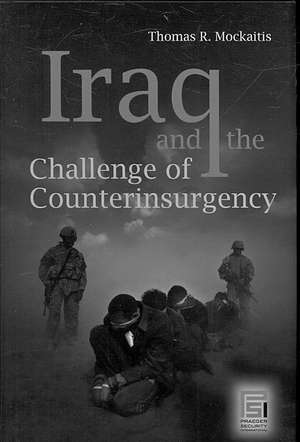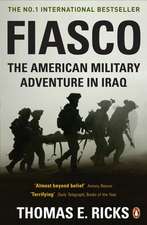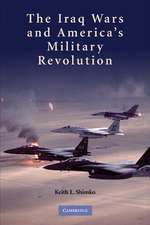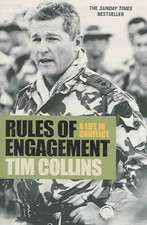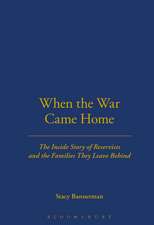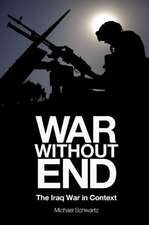Iraq and the Challenge of Counterinsurgency: Praeger Security International
Autor Thomas R. Mockaitisen Limba Engleză Hardback – 29 mai 2008 – vârsta până la 17 ani
Din seria Praeger Security International
- 18%
 Preț: 334.19 lei
Preț: 334.19 lei - 8%
 Preț: 335.53 lei
Preț: 335.53 lei - 34%
 Preț: 376.10 lei
Preț: 376.10 lei - 46%
 Preț: 443.64 lei
Preț: 443.64 lei - 29%
 Preț: 240.11 lei
Preț: 240.11 lei - 8%
 Preț: 304.56 lei
Preț: 304.56 lei - 34%
 Preț: 373.82 lei
Preț: 373.82 lei - 19%
 Preț: 412.79 lei
Preț: 412.79 lei - 19%
 Preț: 338.42 lei
Preț: 338.42 lei - 18%
 Preț: 335.62 lei
Preț: 335.62 lei - 27%
 Preț: 377.35 lei
Preț: 377.35 lei - 27%
 Preț: 376.75 lei
Preț: 376.75 lei - 18%
 Preț: 336.46 lei
Preț: 336.46 lei - 18%
 Preț: 321.73 lei
Preț: 321.73 lei - 27%
 Preț: 384.51 lei
Preț: 384.51 lei - 18%
 Preț: 320.50 lei
Preț: 320.50 lei - 18%
 Preț: 320.50 lei
Preț: 320.50 lei - 18%
 Preț: 321.35 lei
Preț: 321.35 lei - 24%
 Preț: 420.54 lei
Preț: 420.54 lei - 14%
 Preț: 335.99 lei
Preț: 335.99 lei - 18%
 Preț: 355.82 lei
Preț: 355.82 lei - 18%
 Preț: 319.83 lei
Preț: 319.83 lei - 18%
 Preț: 334.28 lei
Preț: 334.28 lei - 32%
 Preț: 354.48 lei
Preț: 354.48 lei - 14%
 Preț: 335.14 lei
Preț: 335.14 lei - 38%
 Preț: 405.98 lei
Preț: 405.98 lei - 40%
 Preț: 571.34 lei
Preț: 571.34 lei - 18%
 Preț: 321.85 lei
Preț: 321.85 lei - 18%
 Preț: 323.25 lei
Preț: 323.25 lei - 18%
 Preț: 253.28 lei
Preț: 253.28 lei - 40%
 Preț: 571.50 lei
Preț: 571.50 lei - 14%
 Preț: 333.72 lei
Preț: 333.72 lei - 18%
 Preț: 301.73 lei
Preț: 301.73 lei - 19%
 Preț: 352.96 lei
Preț: 352.96 lei - 26%
 Preț: 387.80 lei
Preț: 387.80 lei - 18%
 Preț: 302.77 lei
Preț: 302.77 lei - 14%
 Preț: 333.91 lei
Preț: 333.91 lei - 17%
 Preț: 325.80 lei
Preț: 325.80 lei - 24%
 Preț: 338.58 lei
Preț: 338.58 lei - 34%
 Preț: 414.73 lei
Preț: 414.73 lei - 18%
 Preț: 354.30 lei
Preț: 354.30 lei - 29%
 Preț: 254.29 lei
Preț: 254.29 lei - 18%
 Preț: 354.11 lei
Preț: 354.11 lei - 18%
 Preț: 334.38 lei
Preț: 334.38 lei - 14%
 Preț: 302.68 lei
Preț: 302.68 lei - 18%
 Preț: 322.97 lei
Preț: 322.97 lei - 27%
 Preț: 376.50 lei
Preț: 376.50 lei - 27%
 Preț: 322.81 lei
Preț: 322.81 lei - 27%
 Preț: 382.91 lei
Preț: 382.91 lei - 18%
 Preț: 320.87 lei
Preț: 320.87 lei
Preț: 253.20 lei
Preț vechi: 309.71 lei
-18% Nou
Puncte Express: 380
Preț estimativ în valută:
48.46€ • 50.40$ • 40.00£
48.46€ • 50.40$ • 40.00£
Carte tipărită la comandă
Livrare economică 14-28 aprilie
Preluare comenzi: 021 569.72.76
Specificații
ISBN-13: 9780275999476
ISBN-10: 0275999475
Pagini: 208
Dimensiuni: 156 x 235 x 21 mm
Greutate: 0.47 kg
Editura: Bloomsbury Publishing
Colecția Praeger
Seria Praeger Security International
Locul publicării:New York, United States
ISBN-10: 0275999475
Pagini: 208
Dimensiuni: 156 x 235 x 21 mm
Greutate: 0.47 kg
Editura: Bloomsbury Publishing
Colecția Praeger
Seria Praeger Security International
Locul publicării:New York, United States
Notă biografică
Thomas R. Mockaitis is Professor of History at DePaul University in Chicago. As a consultant for the Center for Civil-Military Relations at the Naval Postgraduate School (Monterey, California), he also teaches civil and military responses to terrorism at venues around the world. He is an expert in insurgency, counterinsurgency, peace operations, terrorism, unconventional war, and civil-military cooperation and a frequent media commentator on those subjects. He is the author of four books and numerous articles. His most recent book is The New Terrorism: Myths and Reality (PSI, 2006). He is also working on The Iraq War: A Documentary and Reference Guide for Greenwood Press.
Cuprins
Old Lessons for a New WarList of AbbreviationsIntroductionChapter 1. The Nature of the BeastChapter 2. The American Way of WarChapter 3. Iraq in ContextChapter 4. From Shock and Awe to Clear and HoldChapter 5. The Lost YearChapter 6. Getting it RightConclusions: Prospects, Possibilities, and Lessons to be LearnedBibliography
Recenzii
In Iraq the author sees the U.S. military facing the most complex counterinsurgency (COIN) campaign in its history. He judges the post-invasion phase of Operation Iraqi Freedom (OIF) as badly planned, horribly mismanaged, and initially a prime example of how not to conduct a COIN campaign..From the planning phase through initial occupations, he analyzes the invasion of Iraq..his recommendations regarding the absolute need for our Services to greatly strengthen COIN training and organization make good sense.
